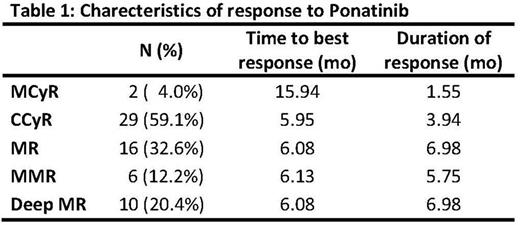Abstract
Ponatinib, an oral tyrosine kinase inhibitor with potent activity against native and mutant BCR-ABL1, is approved for patients with refractory chronic myeloid leukemia (CML) or Philadelphia chromosome-positive acute lymphoblastic leukemia (Ph+ ALL) for whom no other tyrosine kinase inhibitor (TKI) therapy is indicated, or for patients with the T315I mutation.
Aim The aim of study was to assess real life efficacy and safety of ponatinib in a retrospective analysis of 49 patients with resistant/refractory CML from 9 Italian Hematological Institution.
Results: At baseline, median age was 55 years and median time since diagnosis was 4,4 years; BCR-ABL1 kinase domain mutations were reported in 30,6 % of patients, with T315I only in 4 (26,6%) patients. The majority of Patients were heavily pretreated, with 26,5% having received 2 prior TKIs and 46,9% having received ≥3 prior TKIs; 28,2 % of patients were in 2nd line treatment due to resistance. At Ponatinb start, 42 patients were in chronic phase, 4 in accelerate phase and 3 in blastic phase. 18 pts showed comorbidities, no cardiovascular and/or cerebrovascular eventswere present at diagnosis and before starting Ponatinib. Baseline cardiovascular risk factors for all patients were Diabetes 3/18, hypertension 12/18, hypercholesterolemia 1/18; general history of cardiovascular disease,( not ischemic) was reported in 3/18 patients at baseline. Concomitant medications were: Antihypertensives in 12/18, aspirin in 1/18, antidiabetes agents in 3/18, lipid-modifying agents in 1/18. The 91,8% patients performed cardiovascular evaluation before starting treatment resulting in normal cardiovascular function in the majority of them. Abnormalities were present in only 4 pts: one lower ejection fraction, one pericardic effusion and two hypertensive cardiomyopathies.
The initial dose was 45 mg/day in 24 (48,9%), 30 mg/day in 16 pts (32,6%) and 15 mg/day in 9 pts (18,3%).
31 out of 49 patients obtained a response to Ponatinib. The cumulative response rates was: major cytogenetic response (MCyR), 4%; complete cytogenetic response (CCyR), 59.1%; molecular response 32,6% (major molecular response (MMR) 12,2%; Deep MR (MR4, MR 4.5, MR5) 20,4%. Characteristics of response to Ponatinib therapy are reported in table 1. Interestingly, almost all molecular responder patients maintained Ponatinib response.
At the time of analysis, 36 patients are still on therapy. Ponatinib was discontinued in5 of the 31 responders patients due to side effects (n= 2), death (n=2), lost to follow-up (n=1). The side effects reported were vascular CNS stoke and back pain with bad compliance. The two deaths occurred after bone marrow transplantation in one patient and for causes not disease related for the other.
Dose reduction was performed in 11 out of 31 responder patients because side effects (n=8: 5 dermatological, 1 atrial fibrillation, 1 hematological, 1hypertension ) or optimal response (n=3 ).
The adverse events were reported in 21 of 49 patients. Non hematological side effects were: 9 dermatological, and 2 arthralgia , 1 patients developed diabetes, 2 patients ipercolesterolemia; 5 patients had hematological side effects (1 piastrinopenia, 3 pancitopenia, 1 MDS with trysomy 8). About cardiovascular events, only 5 patients showed these effects (1 atrial fibrillation, 3 hypertension, 1carotid thrombosis, 1 ischemic cardiopathy ), no one severe.
CONCLUSION As in 5-yr long term results of PACE trial, also in our real life retrospective analysis, Ponatinib continues to show deep, lasting response in heavily-pretreated pts with CP-CML. In our analysis, almost all patients who obtained the molecular response, maintained it during the treatment, despite dose reduction, which should be associated to improved survival, also in a heavily-pretreated pts.
Specchia: Incyte: Consultancy, Honoraria; Novartis: Consultancy, Honoraria; BMS: Consultancy, Honoraria; Pfizer: Consultancy, Honoraria. Pane: Novartis: Honoraria, Speakers Bureau.
Author notes
Asterisk with author names denotes non-ASH members.


This feature is available to Subscribers Only
Sign In or Create an Account Close Modal